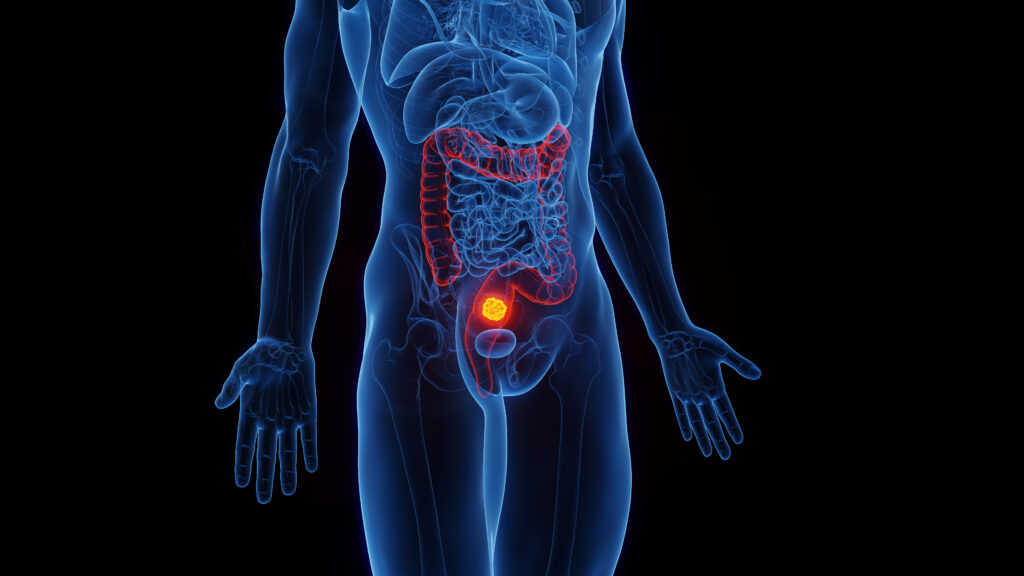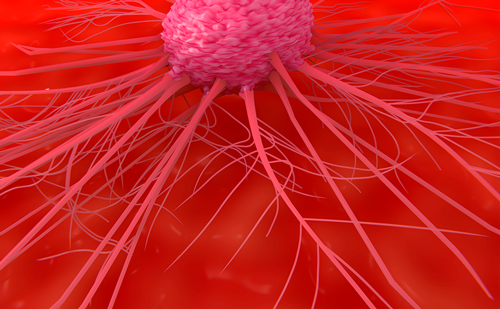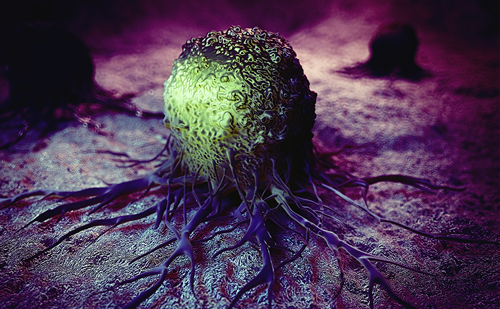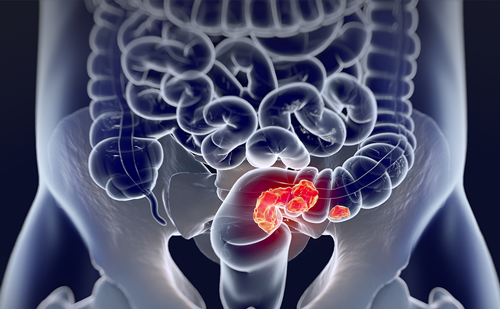Gastrointestinal stromal tumor (GIST) is the most prevalent mesenchymal tumor of the gastrointestinal tract, primarily arising in the stomach and small intestine.1,2 It can be a life-threatening disease, with an expected incidence of approximately 5,000 new cases each year in the US.3,4 Surgery is the standard of care for primary GISTs and the goal of resection is to completely remove the tumor with clear margins.5,6 As GISTs are soft and fragile, surgical resection needs to be performed carefully to avoid tumor rupture or hemorrhage, with a resultant increased risk for tumor dissemination.5,7,8 Surgery may not always be indicated, especially in instances of metastatic or locally advanced GIST.
Prior to the approval of the targeted agent imatinib, there were no other effective therapies for metastatic GIST as both radiotherapy and conventional chemotherapy were generally ineffective.5,9–14 Imatinib mesylate (Gleevec®, Novartis) is a potent inhibitor of several receptor protein tyrosine kinases including KIT, platelet-derived growth factor, and BCR/ABL.15–19 Its use in GIST is based on the fact that most GISTs express KIT, and up to 90% of patients have a c-kit or PDGFRalpha gene mutation.16,20,21 GISTs frequently result from gain-of-function mutations in the c-kit gene, which encodes the transmembrane tyrosine kinase KIT.16,20–23 Once this mutated gene is expressed, KIT signaling is constitutively activated, resulting in uncontrolled cell proliferation and resistance to apoptosis.20–22 In GIST, imatinib primarily acts by inhibiting this pathophysiological pathway, thereby inhibiting tumor growth. While surgery remains the standard of care for GIST, imatinib therapy has altered the treatment paradigm. Imatinib has been shown to induce partial response or stable disease in 80% of patients with metastatic GIST.24,25 In both unresectable and/or metastatic GIST patients, imatinib therapy has demonstrated durable response rates and favorable progression-free survival (PFS) and overall survival (OS).24–27
The US Food and Drug Administration (FDA) has approved imatinib for the treatment of patients with KIT-positive unresectable and/or metastatic malignant GIST. The recommended dose of imatinib is 400mg/day. The US-specific prescribing notes state that a dose increase to 800mg/daily (given as 400mg twice daily) may be considered depending on the impact of the lower dose (400mg/day) on disease progression.
Around 46% of GIST patients are candidates for surgery, and the tumor can be completely resected in most of these patients;28–31 however, 40–90% of these patients have a documented recurrence within two years of surgery with median disease-free survival (DFS) as low as three years.28–31 Furthermore, the five-year OS rate after complete surgical resection is only about 48–65%.29,32–34 This has led to the search for an adjuvant therapy option to prevent or delay recurrence and, hopefully, to improve OS rates. Imatinib is currently being evaluated in the adjuvant setting for primary GIST treatment, and the published data from the adjuvant trials will be discussed in this article. The rationale for imatinib in the adjuvant setting is based on its demonstrated efficacy and tolerability in patients with unresectable and/or metastatic GIST, and its potential benefit in an earlier and minimal residual status, particularly in patients at higher risk of relapse.American College of Surgeons Oncology Group Trials
The American College of Surgeons Oncology Group (ACOSOG) evaluated the relative benefits of adjuvant imatinib therapy in patients who have undergone complete gross resection of primary GIST in two clinical trials.
American College of Surgeons Oncology Group Z9000
This was a single-arm, open-label, multicenter, phase II study.35 Patients recruited to the study had primary KIT-positive primary GIST, with a high risk for recurrence (tumor size ≥10cm, tumor rupture, or fewer than five peritoneal metastases). They were required to undergo complete gross resection of the primary GIST. Imatinib 400mg /day was given orally for one year, beginning within 84 days of resection. The patients planned follow-up is for up to 10 years. The trial is closed to accrual and preliminary data have been presented in abstract form, based on 107 evaluable patients. These early data suggest that imatinib was welltolerated by all patients. The study indicated that imatinib can prolong recurrence-free survival (RFS) and is associated with improved OS compared with historical controls (see Table 1).
When imatinib treatment was discontinued, patients with exon 9 mutations quickly relapsed (0% RFS at two years), while those with exon 11 mutations experienced a lower rate of recurrence (62% RFS at three years).35 This indicates a link between the type of tumor mutation and the rate of recurrence. In the metastatic setting, it has been shown that a high dose of imatinib 800mg/day can lead to a significantly superior PFS rate in GIST patients with exon 9 mutations compared with a lower imatinib dose of 400mg/day.36 Thus, an interesting question for future clinical trials would be to evaluate whether a higher imatinib dose or a longer treatment duration in the adjuvant therapy of GIST patients with a mutation in exon 9 may prove to be more efficacious. Some light may be shed on this matter when the mutational status of the patients on Z9000 and Z9001 are published and compared with the recurrence data.
American College of Surgeons Oncology Group Z9001
This is a recently completed randomized, double-blind, placebocontrolled, cross-over, multicenter phase III study.37 The main entry criteria were tumor size ≥3 cm and KIT-positive primary GIST with either intermediate or high risk for recurrence. Patients were required to undergo a complete gross resection of the sarcoma. Patients were then randomized to receive either oral imatinib 400mg/day or oral placebo once daily for one year. During the treatment phase, if there was recurrence treatment assignment was unblinded and patients on placebo were given the option of receiving therapy with imatinib. Patients already receiving imatinib were given the option of increasing their dose to 800mg/day. The primary end-point was RFS for a follow-up period of 10 years. The anticipated patient accrual for this trial was halted prematurely on the recommendation of an independent data monitoring committee. This recommendation was based on a planned interim analysis that showed that a statistical difference had been achieved for the primary study end-point of RFS, favoring the treatment arm.
The preliminary results of this trial have been published based on 713 patients. In the imatinib arm, one-year RFS was 98% compared with 83% in the placebo arm, with a statistically proven absolute benefit of 16%. The early results of this trial indicated that imatinib can improve RFS following complete gross resection of the GIST. No difference in OS between the two treatment arms was observed. However, the study was underpowered to demonstrate this difference and the cross-over design allowed those patients on placebo to receive imatinib on recurrence. Imatinib therapy was well-tolerated in most patients. This phase III trial also indicated that the higher-risk patients benefited the most (seeTable 2).
Implications of the American College of Surgeons Oncology Group Trials
Based on the preliminary data from the ACOSOG trials, the National Comprehensive Cancer Center Network (NCCN) treatment guidelines for adjuvant therapy in GISTs have been updated.7 These guidelines now indicate that imatinib should be considered post-operatively in the adjuvant setting for patients who have undergone complete resection for primary GIST. In December 2008, the FDA approved imatinib for the adjuvant treatment of adult patients following complete gross resection of KIT-positive GIST, with a recommended dose of 400mg/day.
The early data from the ACOSOG trials are promising, but there are still some areas of adjuvant imatinib therapy that need further investigation. Although the trials have shown that imatinib can delay recurrence, it is currently unknown whether they can indefinitely prevent recurrence. The four- and five-year follow-up results for the RFS rates from the ACOSOG Z9001 trial are highly anticipated as they would shed some light on this area. The other areas that need to be further evaluated include the optimal duration of postoperative adjuvant imatinib therapy and the impact of adjuvant imatinib therapy on OS Duration of Adjuvant Imatinib Treatment
While the data from the ACOSOG trials currently support one year of therapy with imatinib, the optimal duration of adjuvant treatment has not yet been determined. The Radiation Therapy Oncology Group (RTOG) 0132/ACRIN 6665 showed that 83% of GIST patients (median tumor size 9cm) achieved PFS at two years of adjuvant imatinib therapy. Although imatinib therapy was stopped two years after complete gross resection, 68% of the patients had not recurred three years after surgery.38 Preliminary results of a small Korean-based phase II study showed that adjuvant imatinib 400mg/day given for two years in high-risk GIST patients with exon 11 mutation resulted in an RFS rate of 97.9% at one year and 93.3% at two years.39 These studies indicate that a longer duration of adjuvant imatinib may indeed be a viable option. The NCCN recommends adjuvant imatinib for at least one year in patients with intermediate- to high-risk GIST and further indicates that higher-risk patients may require a longer duration of treatment.7 The optimal duration of adjuvant imatinib treatment is currently being investigated by an ongoing multicenter phase III Scandinavian Sarcoma Group (SSG/AIO) XVIII trial.40 Patients with high-/very-highrisk primary GIST stratified by size and mitotic rate who have undergone complete gross resection of the tumor will be randomized to receive either a short (12 months) or a long (36 months) duration of adjuvant imatinib 400mg/day. The estimated accrual for the study is 400 patients. The patients will be followed up for five years. The primary outcome measure is RFS, while OS is a secondary outcome measure.
Overall Survival with Adjuvant Imatinib Treatment
An important treatment outcome of adjuvant therapy in oncology is to improve OS. Early data from the AZ9000 study have shown an improvement in OS in patients receiving adjuvant imatinib compared with historical controls. The five-year follow-up data from the ongoing ACOSOG Z9001 and the SSG/AIO XVIII trials will give further insight into the impact of adjuvant imatinib on OS. Another study investigating the effect of adjuvant imatinib on OS is the European Organization for Research and Treatment of Cancer (EORTC) 62024 trial.41 This is a randomized, open-label, active-control, multicenter phase III trial with an estimated accrual of 750 patients. Patients recruited to this study have intermediate- or high-risk KIT-positive primary resected GIST. Patients were stratified according to several factors, including the risk category (high versus intermediate) and the tumor site (gastric versus other) and then randomized to receive either imatinib 400mg/day or placebo once daily for two years. After completion of the treatment, the patient follow-up will be every three months for two years. At that point, patients will be followed every four months for three years and at least annually thereafter. In this study, the primary outcome measure is OS, while secondary outcome measures include RFS and relapse-free interval. The treatment phase of the trial was recently completed and the results are highly anticipated.
Summary
GIST, a life-threatening disease, is expected to affect at least 5,000 people each year in the US. While surgery is the standard of care for primary GISTs, most of these patients will recur within two years of surgery and there is a need for adjuvant therapy in high-risk patients who have undergone complete gross resection. Preliminary data from published studies have shown that adjuvant therapy with imatinib mesylate 400mg/day for one year can prolong RFS in patients who have undergone complete gross resection of KIT-positive primary GIST. Imatinib has also shown a good safety profile in most patients. The FDA has recently approved imatinib for the adjuvant treatment of adult patients following complete gross resection of KIT (CD117)-positive GIST, with a recommended dose of 400mg/day. Data from ongoing clinical trials will hopefully address the optimal duration of adjuvant imatinib treatment and identify whether imatinib can actually prevent, rather than just delay, recurrence. The question of an advantage for OS has not yet been answered; however, an EORTC trial will provide more data for this critical end-point. ■













